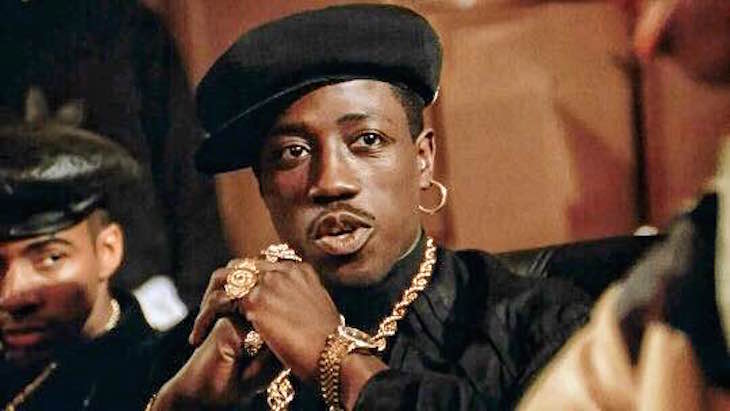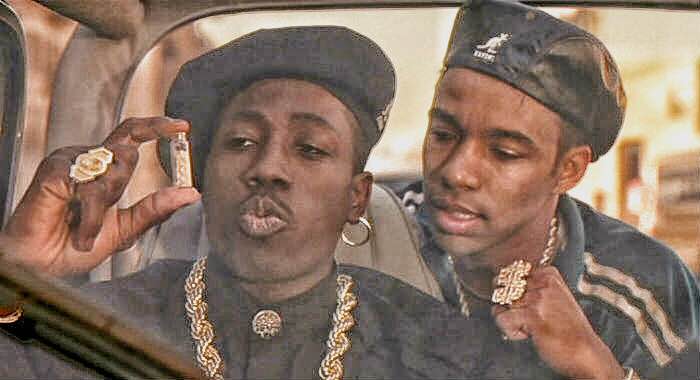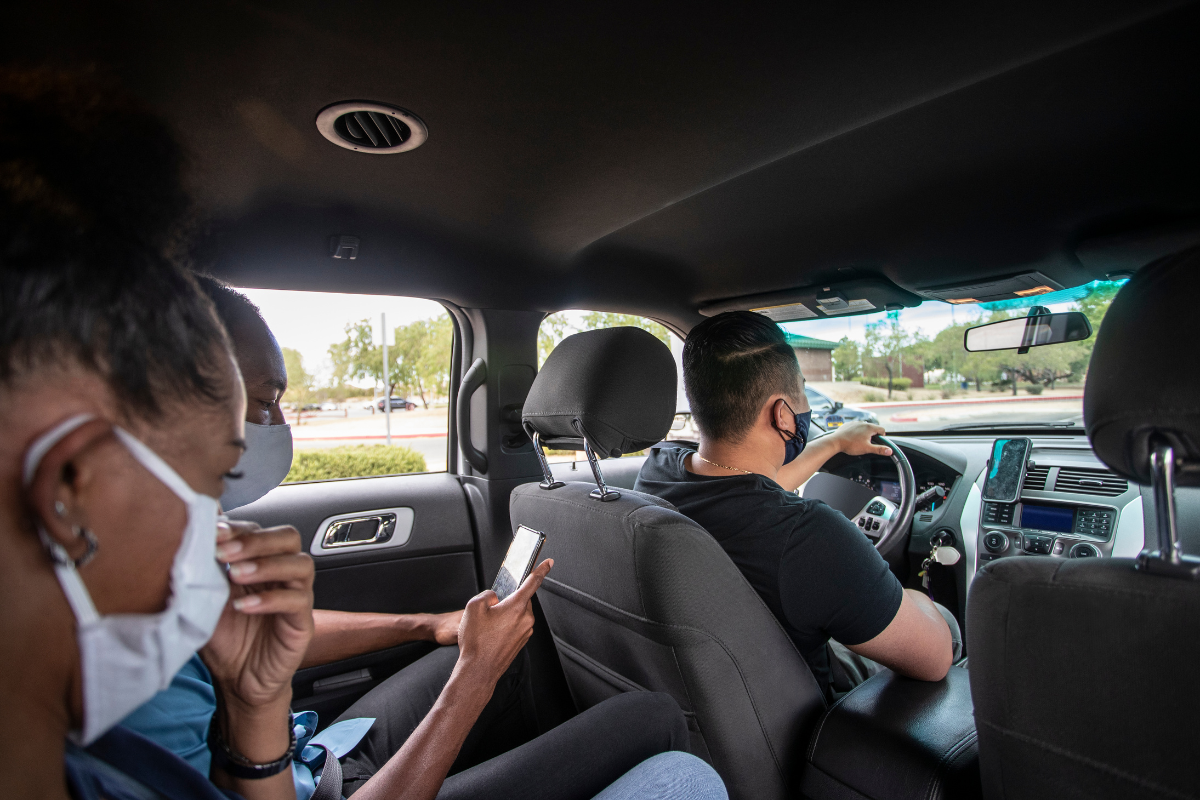PUBLISHED BY REGGIE WILLIAMS
In the mid-1980s, Thomas Lee Wright, a creative executive at Paramount Studios left the company to pursue a career as a screenwriter. One of his first endeavors was to write a treatment for The Godfather: Part III, because he knew Paramount had a high interest in making a third installment of its epic mafia tale, and Wright had a love for the film series. His research in writing that series led him to the story of Nicky Barnes, a drug dealer and one of the most powerful men in New York City, in his heyday. A student of gangster films, Wright saw a noticeable lack in stories about powerful people of color, in the genre. He immersed himself in the mean streets of New York for six weeks and, in the end, emerged with a screenplay about Barnes’ life. That screenplay, would eventually evolve into the fictionalized story calledNew Jack City.
Now, more than 30 years after Wright completed the first draft of that seminal screenplay, New Jack Cityhas become a cultural touchstone for an entire generation. “Nino Brown” remains one of the most iconic antiheroes in film history and is a staple in Hip-Hop culture. And, the film’s impact has endured like few others, affecting celebrities like Jamie Foxx who had an entire New Jack City-themed birthday party, athletes like Marshawn Lynch and Richard Sherman who made it a part of their in-game discussion, and millions of everyday fans who have watched the film countless times.
As the film celebrates its 25th anniversary this year (March 8), discussion about its legacy has reached a fever pitch. Wright, who is currently working on two documentaries, spoke to Ambrosia For Heads this month about how New Jack City went from an idea to a finished film, the evolution of the story and its characters, the influence of The Godfather and Othello, the backstory of central figures like “Nino Brown,” how the story originally ended and much more.
Ambrosia For Heads: What was your inspiration for the film?
Thomas Wright: I had been an executive at [Paramount] studios, and during that time, got a glimpse of how decisions were made, what movies were made, and how they fed their distribution channels. I just felt in general there were whole blocks of our culture that were being neglected or the stories weren’t getting told, at all. At Paramount, I knew they wanted to do another Godfather. I had seen what they had attempted in the past. When I left being an executive, the first thing I did was a treatment for Godfather III. They hired me to write it just to get the ball rolling. Their goal was to get [Francis Ford] Coppola back involved, as was mine. I even devoted my treatment to him in the hopes that [he would get involved]. So I did my draft. When I did my draft, they sent me to the East Coast. I spoke to old Italian guys in Little Italy, South [Philadelphia], Atlantic City, and to some of the guys who had advised on the first two [Godfather] films. They were all suggesting periods of time to write about, when the mafia was strong and periods of history for various [crime] families.
Again and again, when we were potentially talking about doing the doing the film set in the ‘70s, they were talking about this guy who kicked them out of Harlem. Every one of them seemed preoccupied with the fact that they had been forced to leave a section of the city by someone who was very well organized, extremely intelligent, and forceful with leadership that rivaled their own. That was Nicky Barnes. Simultaneous with that sojourn for research purposes for Godfather III, 60 Minutes did a story, as it happened, on Nicky Barnes. [After] that introduction by Mike Wallace, I thought, man, [Nicky Barnes] is iconic and seemed to be important enough for somebody to write about him. So as soon as I was done with my Godfather draft, I went back to the east coast and decided that I would write the story of this iconic character. I just learned as much as I could, and lived there and talked to many, many people who had known him. I wrote it, and it came very quickly too, because I think the timing was right. The zeitgeist—I think the whole country at that period was becoming aware of what was happening in our cities. There’s a history to it and a reason for it.

AFH: Can you tell me the timeline of when you had the idea to when you first made a pitch?
Wright: Absolutely. It wasn’t a pitch. I wrote a screenplay in its entirety, because I had learned that early on as an executive that if you want to tell a story right, you should really tell it in its entirety, if possible. So I wrote a complete first draft; that was at the end of ‘85. I reworked it through the beginning of ‘86. When I got it finished, I took it to my agent. I was with an agency called Bauer-Benedek, which later became United Talent. My agent was a young guy named Danny Halsted who went on to become head of Oliver Stone’s company. At the time, he was like, “Why didn’t you tell me you were writing this? I’ll never be able to sell a movie about a Black drug dealer. Are you crazy? Who’s gonna want to see that?” I said, “Well, I think it’s more than that. I think there’s a strong character here. I think that there’s a strong dynamic between the good guy and the bad guy. It’s classic, man. It’s the classic structure.” He goes, “Well, I don’t know who I’m gonna sell it to. I said, “Let’s try Paramount. That’s a place where I’d spent a lot of time.” I knew Eddie [Murphy] wanted to do something more serious. They had been putting him in comedies. When I was there we had a real amazing run in the early ‘80s of successful films. Eddie’s first couple films: 48 Hours [and others].
AFH: Was Eddie someone you were considering for the project?
Wright: I had no idea when I first wrote it that Eddie was very aware of Nicky Barnes—that he had grown up with an awareness. I guess the legend was something he was always fascinated by. I had spoken to Eddie on several occasions because I was on the set. I followed the dailies on 48 Hours. I had to watch all of the five cameras that were shooting every day and narrow them down to 15 minutes that [crew] could watch. So I got to know Eddie’s work and I got to him a little bit, being on the lot. When I did [my draft for the third] Godfather, because there had been this part of that story where Nicky threw the mob out of Harlem, they had said, “Do you think Eddie could play it?” initially. Then, Eddie at a wrap party for Golden Child…I think we spoke for about 45 minutes about his wanting to do a role that would be darker than what he’d been doing, playing a villain. I think a lot of people feel the same way, that sometimes a villain is more fun to play than a good guy. He also wanted to show his range as well. But the studio felt strongly that his relationship with the studio to be strongly based on comedy and the franchises that they were building in the comedy realm. Although, he brought a lot of dramatic sensibilities to the comedies they were doing. Even though they were comedies, there’d be moments of great sincerity and connection that bespeak his ability as a dramatic actor too. Sometimes as an actor you can’t always find the roles that you’d like to play.
So that is why we thought of him. We went there, and Paramount turned it down summarily—almost immediately.
Danny had spoken to George [Jackson, a producer of Krush Groove] and knew that Quincy Jones’ [production company] was a potential place that might be interested. He took it to them, and very quickly they moved on it. Within 48 to 72 hours, I was on the lot at Warner Bros. talking to them about what the movie could be. We started out approaching the story as if it were the ‘70s, and heroin [was the drug]. Very quickly, George and Doug [McHenry] believed that because we were in the ‘80s now, and because the birth of crack cocaine was transforming everything, from the streets to the criminal justice system, that it would be much more cutting edge to make the story about a more recent period in history. Also, they didn’t really want to have to deal with all the period issues that the ‘70s would have presented. But [more than that], they wanted to get as close as they could to what was happening now. “Now” being the ‘80s.
AFH: So the film began as a biopic set in the ‘70s to a contemporary film?
Wright: Yes, and that was a journey for me in the sense that I had steeped myself in Barnes and that iconic [era]. Barnes himself modeled his operation after the mafia. He had a drug council. Each of the guys, they divided up the city and each guy had a different territory. That table meeting that you see in New Jack[City], that’s directly related to Nicky, and also what you see in The Godfather—guys around the table. You have formal meetings. You dress well. You report in and make deals around that table.
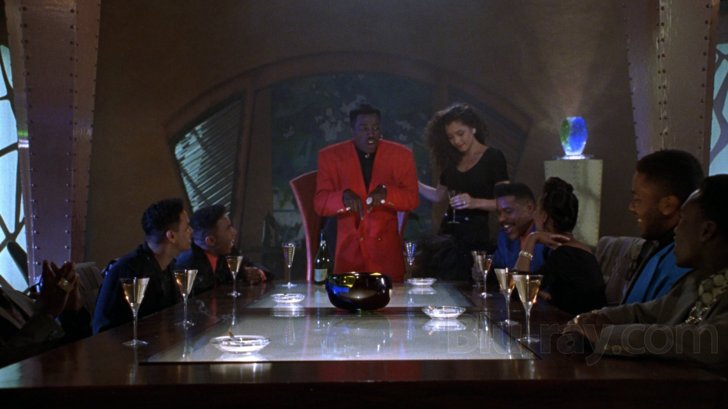
Getting to the ‘80s was [difficult]. I had to basically change a lot of the names of the characters. I had to reconfigure. The Warner execs who oversaw development and production of New Jack City were Mark Canton, future producer of more than 50 films, including 300 and its sequel, David Heyman, producer of all the Harry Potter films, and Lisa Henson, daughter of Jim Henson (of Muppets fame), and eventual producer on over 40 films. I dealt with each one of them at one point in time or another in doing the other four or five drafts that I did. The whole process there was about two to three years of rewrites under those executives. Every movie is a collaboration. The Warner execs prided themselves on the studio. All the great gangster films came out of Warner Bros., if you look back. We tried to view the movie with that, so you had a sense of the classicism that was involved in the making of this movie. While they wanted it to be cutting edge, they also wanted it to have all of the great characteristics of the very best gangster films of the past. We wanted this to be the preeminent new crime film, ‘cause there hadn’t been one since The Godfather that we considered to be worthy of critical attention and hopefully commercial success.
AFH: You’d written an entire script, based on Nicky Barnes. Did it require a complete rewrite when you decided to make it more contemporary?
Wright: I kind of took the Barnes story and overlaid it over The Godfather-esque structure. For me, structure is everything in a motion picture. The structure of a story and the way the characters interact and the way that the story unfolds more or less stayed the same from the beginning. There were some structural changes you had to make—how you meet the man, how he organizes the group, who opposes him, how they achieve some of their success, and how they suffer the downfall. I think [Ambrosia For Heads’] interview with Barry [Michael] Cooper was very, very good in really getting at the heart of all the different influences that a movie can have. I found it really interesting to hear what inspired him.
From my point of view, Barry was brought on when I was really capable of bringing nothing more to the project. They knew that Barry, from his journalism, was cutting edge with current trends and knew [Harlem] like the back of his hand—where the story took place. He was a real find. George goes, “Tom, I think you’ve written all you can on this. Here’s this writer, what do you think?” He showed me some of [Barry Michael Cooper’s work]. I said, “I think it’s absolutely a great idea.” It turned out to be, because the things Barry brought to it, I don’t think anybody else could have. Then, the casting was such that these actors just seemed to be perfect for the roles that they played. They allowed Mario [Van Peebles] to do what he wanted with it as well. Mario allowed the actors to do a lot of improvisation. So sometimes you just sit back and watch all of your collaborators in awe, and you’re so thankful that they’re all bringing so much of themselves to the project.
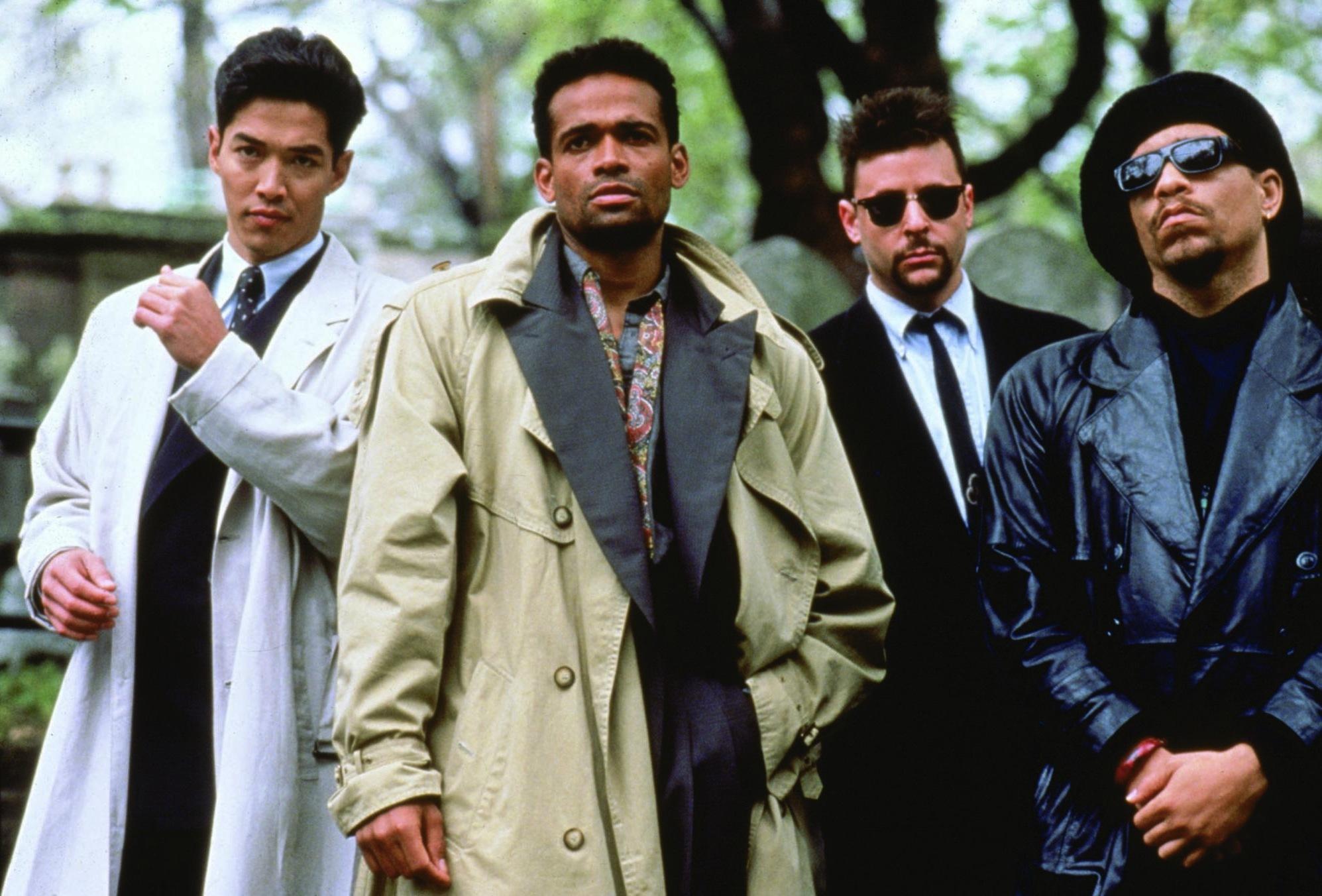
AFH: Could you talk about Mario Van Peebles’ involvement with the film, and how that came to be?
Wright: I need to confirm this, and I’ve been meaning to give Mario a call to confirm this. I heard, around the time of the picture—before I even knew Mario, they were talking about who could direct. It was a lot of the usual suspects. Mario had this wonderful relationship with Clint [Eastwood] because of Heartbreak Ridge. Mario really wanted to direct this. I need to confirm this part of it: I was told at the time, and I’ve heard it since, that Clint, who could do whatever he wanted at Warner Bros… he could walk into the chairman’s office, and read the phone-book. They’d say, “Fine, Clint. Just let us know when you’re done.” [As I understand it, he went in] when [Warner Bros.] had doubts. George said, “We’d like to use Mario, but I think they might be balking a little bit, and I’m not sure Mario is gonna be allowed to direct.” Clint said, “You want me to make a call?” They said yeah. I heard Clint say, “If the young man gets in trouble, I’ll be there. If he doesn’t get in trouble, all’s good. But I’ll come by the set early on and make sure he’s good. If he needs anything, give me a call. Will that help him get the job?” They go, “Uh, yeah.”
AFH: How did you construct “Nino Brown’s” character arc, and that of “Gee Money,” in the re-write from the Nicky Barnes story to New Jack City?
Wright: Part of what traveled from Nicky to “Nino” was…“Gee Money,” there was a [real person] named Guy Fisher, Nicky’s right-hand man. One of the great [William] Shakespeare [plays] I’ve always loved wasOthello. Jealousy was the downfall of the main character—the green-eyed monster. Most of all, [I liked “Iago”] the lieutenant who would whisper into your ear and play to your insecurities. I would say [“Nino Brown’s” arc] was very similar to Nicky Barnes’ rise and fall. Although in the early drafts, I tried to get into more the fact that he’d just been released from prison. How does a man start over when he’s released from prison? Nicky had done a stint. He was released and had to re-establish himself in the neighborhood. In New Jack, you come to Wesley [Snipes] and you see “Nino” already in power, already doing anything that he wanted to do.

In earlier drafts, he didn’t necessarily have that power and privilege to begin with. Applying the [Shakespearian] paradigm to “Nino,” I would have to say we were coming to someone who already has his kingdom. In Shakespearian terms, “Othello” was already a general in the streets. He was in control. He had some power, and people had to take his orders. How he lost his power—the hubris, the overreach, the arrogance, the betrayal that came about, because, in large measure, of the way he conducted himself, were a big part of his downfall. In reality, Nicky’s “kingdom” fell because while he was incarcerated at one point, his right hand man was becoming involved with his woman. The jealousy became so much that he just decided that he was going to give everybody up, and make sure that he got revenge on the betrayal. InNew Jack, of course everything sort of unravels—in large measure because of the efforts of [“Scotty Appleton” played by Ice-T] and [“Nick Peretti” played by Judd Nelson]. They came in and they’re assigned. Law enforcement is aware of them. It’s more of a traditional good guy-cop position—almost an Old West good versus evil. They’re like the law-men. The idea of the undercover cop doing this was intriguing too. Some of the great movies had done this, whether it was Serpico or [others].
AFH: In the case of Nicky Barnes, it was Guy Fisher and [Nicky’s] girlfriend. In New Jack City, it goes the other way. “Nino Brown” obviously takes “Gee Money’s” girl and “Gee Money” becomes jealous, and that led to the downfall of their relationship. So why did that change?
Wright: Right. I think that “Nino” is never weak in New Jack. We see him when he’s already achieved his power. When he’s insulted by the Italians and he gets rid of the Italians, and it becomes a street war by the third act—and it’s pretty much nonstop action. “Nino” takes what he wants. What is still there is that the kingdom collapses because of something as small and as unsettling as the relationship over women. The way that “Nino” treated women became extremely problematic in the course of the story as well. [Laughs] I’m finding myself wrestling with all the different drafts and where [the script evolved to upon completion]. The weaknesses of character—the hubris and those other characters are the things that led to the downfall of the entire operation.
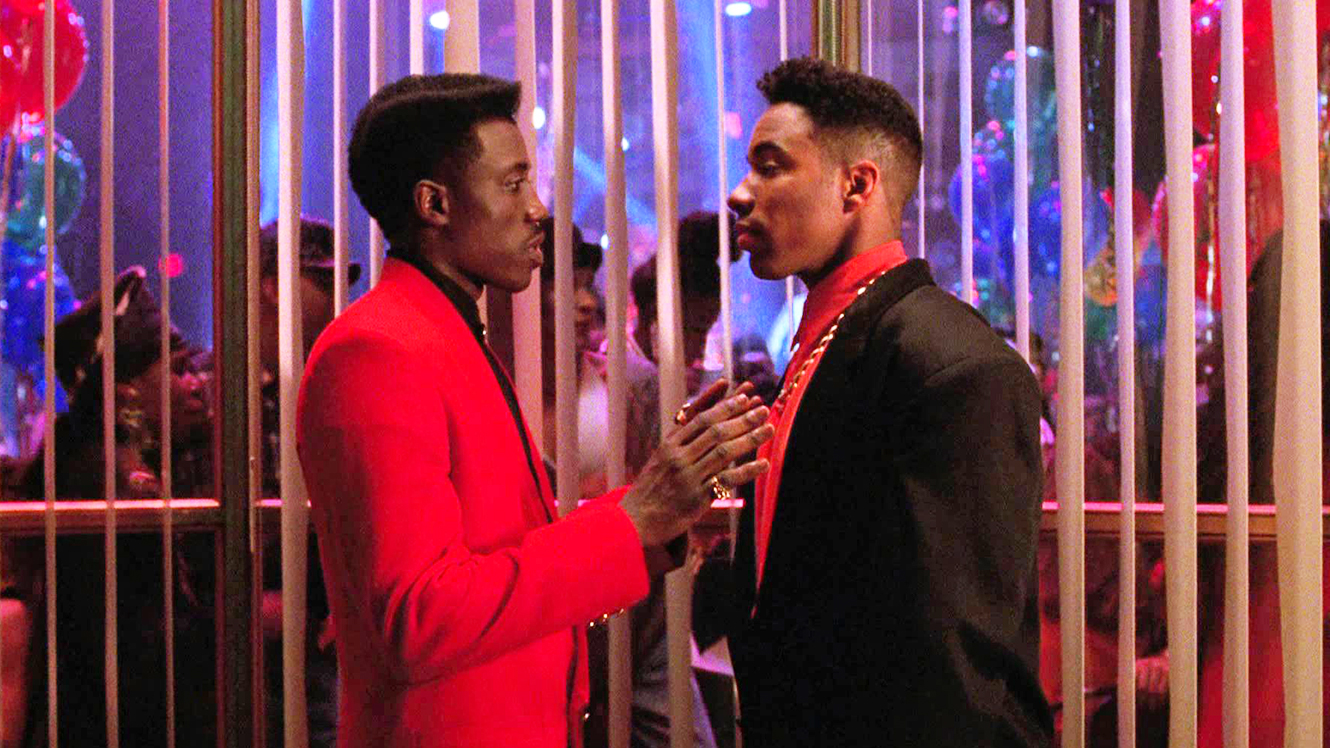
AFH: In earlier drafts, did you depict what “Nino” was like before he kind of became king?
Wright: Yes. I also showed that there was a network that had things waiting for him. So while he was incarcerated, they kept the closet full of some 60 suits, for instance, for him—in impeccable condition. He had 100 pairs of shoes, all ready to go, and polished. Some people in the neighborhood could not wait for him to return, ‘cause he was, in essence, like “the Godfather,” the only justice that they knew. He paid mortgages, he settled disputes, he kept people from starving, he championed people who were being bullied or brutalized. So there was that double-edge nature to his character. He meant two opposites, at the same time, to people. I found that incredibly interesting—that someone would contain their yin and the yang of their character within a single individual.
AFH: “Gee Money” had the opposite arc, kind of. We see him in the opening scene. He hits the basket with money on the line. He’s super clutch. It’s his initial idea to start selling crack. In a lot of ways, he’s the brainchild. Not only does “Nino” steal his women, he steals his ideas too. By the end, he’s just kind of a shell of a man. Why is it necessary for his story arc to go the way that it did?
Wright: I think that that character itself is one of the reasons that Barry got second position screenwriting credit—why he got credit at all. On an original script, you generally have to rewrite half of the script to get credit. If you’re going to get a co-screenwriter credit, you just have to rewrite a third or create an appreciable contribution to the arc of the story. I believe that that particular character was one of Barry’s biggest contributions. I think that it was a way to talk about crack as crack—and Barry’s experience with crack. The crack element of the story that was different than heroin really came through in that character, which was a lot stronger character and a much more important character in Barry’s drafts than any previous draft.
Barry came on right as the project was green-lit, and I think really strengthened that character. I think I said as much too, at the time. We had a good conversation after he had done has drafts. We were the only two writers, really, to have been given a crack at this movie. The reason that I got [credited with] “sole story” was pretty much every character that existed in the final shooting script had roots and existed in all of my prior drafts. Certainly, the structure was there. Many of the original scenes made it all the way to the final shooting script. I would say that how “Gee Money” introduced crack to “Nino,” how crack also played a role in destroying them: the very thing that’s most profitable and lucrative is the very thing that destroyed them. That was an important contribution [made by Barry Michael Cooper]. That was something that Barry had a unique angle on; he had written about the crack epidemic. He had written about how crack had ravaged the city. I think that was one of the reasons that George was excited to have him be part of the film. It really did bring it into the present, and made it a very current thing for the audience.
AFH: Was there ever a point in the script drafting where you showed the rags-to-riches “Nino,” where he was at the rags point?
Wright: I did not go into his childhood. I can actually send you the first page, if you want to see it. The whole thing about bringing turkeys to the neighborhood…in my script, the snow is falling. He comes out pulling body-bags out of the trunk of his limo. [Laughs] Everybody is like, “What the hell?” The lights snap on around the neighborhood. “Why is he pulling body-bags out and putting them on the sidewalk?” It’s an eerie scene when the whole neighborhood becomes aware of his return. In point of fact, inside the body-bags are turkeys that he’s giving away for the holidays. [Laughs] People start taking the turkeys. Then people start shouting. The shouts are of alarm. Then everybody is out to celebrate. “Hey, ‘Brown’ is back.”
That whole thing that you get a life-sustaining turkey, and at the same time, it’s the holidays, and some point can’t afford to have a big holiday meal. And there are families that are gathering around to celebrate the bounty that “Nino” is giving them.
Getting back into the history of him, I had histories drawn for each character. You know when you’re writing, you want to do that for yourself. Very often, you’ll write the background of the character, so you can refer to it and go back. “What would he say in this situation given that he’d done such-and-such?” I did that. None of that made it into the film because you also want to enter a character’s life when something of significance is about to happen, and/or there is something they’re about to collide with. You come into a scene as late as you can. And you leave at exactly the right moment. All that to say: yeah, the earlier drafts had more of him before he became powerful. The reason he really became powerful, in the earlier drafts, was that before he had all these things preserved for him by those that cared for him, he also had growing ambition that only grown [more] while he was incarcerated, to make a difference. And he was a guy who frankly, was never out of touch with the streets—even as he left.
AFH: It always felt a bit abrupt and out of place in the film that “Nino” was able to place everything on “Kareem.” Where did that come from?
Wright: [Laughs] I couldn’t agree more! Thank you for saying that. George wasn’t really happy when they cut 15 minutes out of the end of the movie. They wanted to hurry up and get to the end of the movie. That’s why it becomes one long…the motorcycle assassinations, the pulling the machine guns, it just becomes one long battle in the war. So you take out all of the texture and all of the relational interplay in the third act, and it becomes a different movie.
AFH: So what were the key story elements of those 15 minutes?
Wright: I had some really important one-on-one scenes. The scene on the roof is one of my favorite scenes in the film. We had variations on that throughout the development of the script. Because, again, the Coppola contribution to The Godfather, the details of the relational, emotional interaction of the key characters, that’s what keeps us emotionally involved. Quite frankly, the emotional violence of a story is in many ways more important than the actual violence. Then, the aftermath of the actual violence, the emotional aftermath and the consequence of the violence is everything in leaving an audience affected, and in some cases, shattered by what they’ve witnessed.
I was hoping that those [effects] would be preserved all the way through to the end. I knew that “Nicky”—and in further drafts “Nino” took advantage of the spotlight of being on the stand to give up the people who had supported him throughout. He betrayed them, in public, in a very vindictive way. In the great courtroom dramas, you always have the trial. The courtroom scene can be absolutely riveting if it’s played well, and written well, and the timing is well-directed. Those scenes can be among the most compelling in cinema. I had hoped that we had had a scene like that, but it was reduced to what you saw in courtroom, where everything was very perfunctory, and there were only one or two lines left. Previously, there had been a dozen. For each line that was left, we had longer, sort of cat-and-mouse interplay with the prosecutor and [“Nino Brown”]. They cut a deal pretty quick [laughing] in New Jack, there toward the end. A lot of it was done in whispers. A lot of it was done off-camera. Doug McHenry played one of the prosecutors at the table there, and did a cameo. They cut a deal, in my mind, much too quickly—in a way that could have been really powerful. Again, it’s a [choice] the producers made, along with the studio, to go to achieve the effect of shock and surprise, where I had hoped that the emotional resonance would be the thing we’d be going for.
[In Godfather, Pt. II], you see “Michael” staring out at the lake. He’s had his own brother killed. We don’t even see that take place; we hear the echo of the gunshot on the misty surface of the water. We know that “Al Neri” has killed [“Fredo Corleone”] on “Michael’s” orders. Then you see “Michael” quietly sitting in a big picture window, realizing that he’ll never be able to retrieve his soul, and he’ll never be the same.
I thought we’d have that, but no.

AFH: You mentioned other one-on-one interactions. Do you remember some of the key ones?
Wright: I think we had a couple of other people take the stand, from his [Carter] organization. Everyone was able to follow the plan and tell the lies appropriately until “Nino” got up there, and you realized he’s [going to testify against them]. The variations on their truth which had some uniformity when they took the stands, we he began to vary, the tension was intense. You knew that he wasn’t going to follow the [testimony] script that they had all agreed upon.
Ice’s character was called “Oz” in one draft. “Oz” gets “Nino” in the backroom. I had what I thought was some really powerful head-to-head moments where—not the traditional [suspect] being questioned in the backroom scene that we’ve seen many times, but more the head-to-head, equally intelligent, equally crafty, equally strong—and represented by a cadre of people who did his bidding on the legal front. I had a strong presence for his attorney in one of the drafts, so you got a sense of how the legal system was manipulated. When you think about it, in New Jack, especially at the end, the official system is virtually absent. I had worked very hard early on to create a world where he was constantly escaping, through legal loop-holes and strategies, the fate that would otherwise befall him, basically because he could afford to pay the very best attorneys.
AFH: I have to assume then, that in earlier versions, there was a lot more groundwork laid for “Nino’s” placing the blame on “Kareem?”
Yeah. I had had, in previous drafts, [“Nino’s”] slow-dawning realization the depth of betrayal that he was suffering at the hands of Guy Fisher—or “Gee Money”—and some of the other guys who were on the outside. When you’re [incarcerated], you depend on the people who are taking care of your family, taking care of the streets, taking care of the business. I had had scenes where [“Nino”] was being pressed by the authorities, or the prosecutor and him were one-on-one. He was holding up well. And then he would hear a conversation, or somebody would pay him a visit and give him a piece of information, or he would have a gut instinct. At one point I had him have a couple of nightmares where he was envisioning what was happening while he was inside, to everything that he had built up. Everybody that he depended on was beginning to fold away, or cave in, or abandon him. That slow-dawning realization was a huge part of what was breaking in him while he was cut off—from the women he loved to the friends that he loved. While he held up for the most part in those encounters with the prosecutor, for the most part, by the time he got to the stand [it was different]. I had looked at transcripts—many, many, many pages of transcripts of Barnes and others in a similar position, who when they got on the stand, you’re not even realizing that when they got on the stand, they’re gonna give up everyone around them, ’til you’re well into the session. You can’t take up all of your screen-time with that, but you can take key epiphanic moments. If there’s an epiphany that he has, that the audience can see in his eyes, that’s gold—that’s what you want an audience to be able to recognize, ‘cause they’ll be completely invested in what’s about to happen now. What happens, in the prior drafts is that giving in and giving up is so powerful because you most of all care about the outcome of that proceeding. Because if you don’t care about the proceeding—and what could happen—execution or incarceration for many, many years, you’re not gonna be moved by the outcome. That’s what I had in there—slow unfolding, key moments in the questioning when you see him beginning to break, and then when he begins to give people up. It’s not just about people raising an eyebrow for a minute when their name is mentioned from the stand—which is what ended up being in the movie [chuckling], it’s the unfolding of the argumentative and investigative prodding of the prosecution over a 10 or 15-minute period of time where there is something at stake. In point of fact, you don’t know what the outcome is gonna be.
AFH: How did it end in the version you just described?
Wright: I had a montage from the testimony. You go outside the courtroom, those guys are all sitting there, listening carefully to every word he was saying. They were spread all over the city. I had them arrested. I had them trying to flee. A couple of guys took on with gunfire [against the cops]. It was a montage of the…you saw the kingdom fall from within, on the stand, through “Nino’s” eyes. Then you saw the kingdom [outside] fall as this betrayal took place inside the kingdom.
You come back into his appeal, and you move close into his face—just where you started, and you see the full impact of where he’s been and how he’s left with nothing. He’s left with nothing because he’s lost his faith in those around him. He loses faith, not for no reason, but because all these other people had betrayed him. I think that’s the moral lesson.
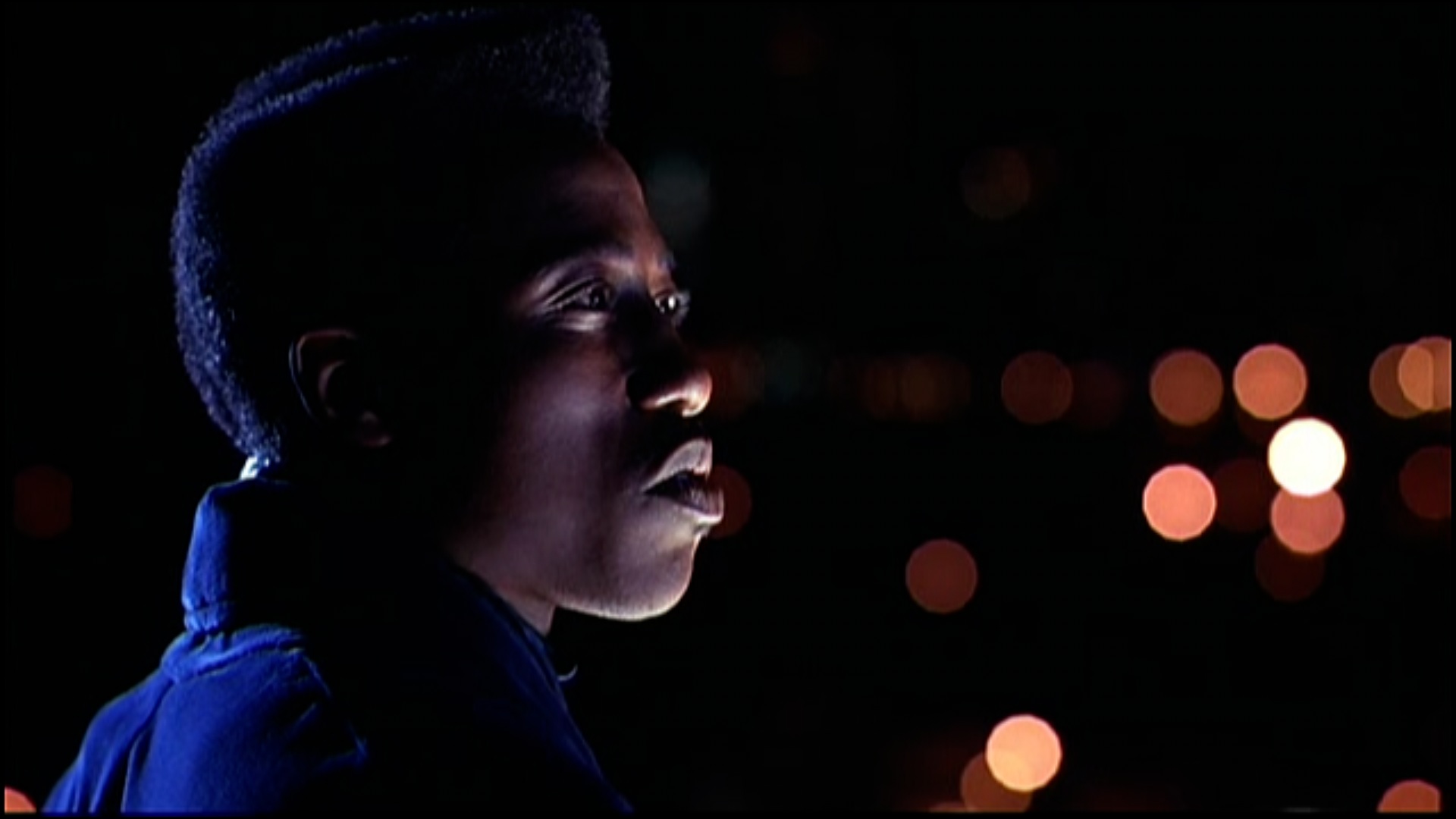
AFH: That’s pretty epic. So there’s no him-getting-taken-away-in-handcuffs scene or anything like that. You see where things are headed, but there’s no definitive resolution. You know that, inside, he’s lost everything from his crew to his kingdom, and you know that it’s going to end in some tragic fashion.
Wright: That’s absolutely right and that’s very well said and succinctly said as I’m grasping to remember details, but that’s exactly right. That’s what I was working for.
AFH: Why do you think this film continues to endure 25 years later?
Wright: I would hope that the work that was put in by all the collaborators who participated in this project and some of the magic of the time, and all the hard work that everyone put in amounted to something that they can all be proud of. The answer of what makes any story resonate from one generation to the next is a mysterious process. So the short answer is I don’t know for sure. But I hope it’s a product of the hard work and fidelity to the original impulse that gave rise to drawing these characters is something that people will always be able to relate to. It is a mystery why we still read certain stories and watch certain films. As an artist, I’m just grateful that people continue to care that we’ve tried to do. Thanks for letting me talk about it a little bit.
Thomas Wright is still an active filmmaker, and he is currently working on two documentaries. One film is about Los Angeles after the Rodney King Riots, particularly from the point of views of the gangs. The documentary is, in part, a follow up to Eight-Tray Gangster: The Making of a Crip, a film Wright made about Sanyika Shakur (aka Monster Kody) and his brother Kershaun Scott (a/k/a Lil Monster). Wright’s other documentary focuses on what’s happening to our elders and elder abuse around the country, an issue that is pervasive.

